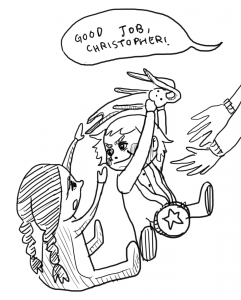USC should condemn Columbus Day
In solidarity with students of Native American ancestry, Brown University officially recognized Columbus Day as Indigenous People’s Day as of Feb. 2, effectively dismantling a pillar of symbolic oppression. In this instance, Brown is seen as a leading university that works for diversity, while USC’s disregard of the matter perpetuates a legacy of enslavement, exploitation and genocide and is a blatant stab in the back to Native American students. All things considered, this comes as no surprise — why would a university that does not include Native Americans as part of its student race demography and in fact places them under the empty moniker of “Other” — show solidarity for a population it intentionally does not recognize? Just as the faculty at Brown voted to designate the second Monday in October as Indigenous People’s Day, the faculty, staff and student body at USC must remind the administration that its silence in the face of oppression is compliance with the displacement of Native American culture and history in academic spaces.
It is important to note that USC does not observe Columbus Day officially; however, its failure to acknowledge what this day symbolizes to Native Americans is an extension of years of oppression, and it does nothing to accommodate the subsequent anger, frustration and betrayal students of indigenous backgrounds may feel. In opposition to the nationwide observance of Columbus Day, a counter-celebration such as Indigenous People’s Day sends a message of support and visibility to a group that has been kept in the shadows of white picket fences, Western notions of civilization and the American Dream. In light of the massacre, enslavement and degradation of Native Americans throughout our nation’s history, ignoring what this day means to Native Americans is just as insulting as observing Columbus Day. Both practices work to erase Native American history and culture, which in fact was the goal of Columbus and the later repercussion of settler colonialism that devastated the Native American population.
The veneration of Christopher Columbus is an act of violence directed at indigenous communities because it intentionally prompts the idolization of a man who “discovered” America while stealing the property, life and future of Native Americans. In the same way that it is unacceptable to identify Adolf Hitler as anything other than the man behind the Holocaust, it also inappropriate to attribute Columbus to anything but a man responsible for the genocide of Native Americans.
Inaction on the part of USC contributes to Columbus’s legacy — a legacy intended to diminish the experiences, perspectives and shared histories of indigenous students. Doing nothing sends a message of unapologetic indifference to these students. Clearly, USC does not feel obligated to refute generations of oppression to create a safe and inclusive academic environment. However, it should be of utmost importance for the University to stand in solidarity with students of Native American ancestry by not only addressing but also condemning the observation of Columbus Day.
Brown’s decision to institute Indigenous People’s Day should be commended and mirrored by USC. After all, Native American students, too, are a part of USC and deserve the respect, recognition and legitimacy that was not afforded to their ancestors some generations ago.
Lida Dianti is a junior majoring in international relations. Her column, “That’s So Racist!,” runs Wednesdays.


This piece is evidence that our indoctrination of the youth is a success. No one will question its veracity. Mission completed.